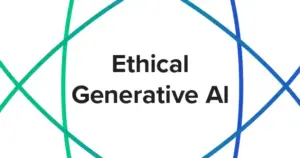Generative AI is defining the tomorrow of innovation, creativity, and work. It assists in writing, designing, education and research, but also comes with threats unless handled with care. We require good morals to lead its development. The 5 Pillars of Responsible Generative AI, transparency, fairness, privacy, accountability and human-centric values, provide a road map towards safe use and fair use. This is what these principles allow us to generate trust and save society as AI gets stronger.

Transparency and Explainability
Transparency does not mean that AIs are to be magic black boxes. Individuals utilizing AI need to know how and why it achieves some results. This includes defining the training of this model, the type of data it works with and the production of outputs. It also contributes to trustworthiness because the users can understand the rationale behind the decisions, and not receive the results without any explanation. When companies are not secretive about their AI systems, it will eliminate fear and misunderstanding. Concisely, the more understandable AI is, the more people are ready to embrace AI as a handy and harmless technology.
Fairness and Non-Discrimination
It should not be exclusive to a small group of people, but AI should be available to all. On the negative side, discriminatory outcomes may be reached due to prejudiced data that may discriminate against individuals on the basis of gender, race, culture, and language. Responsible generative AI should be designed on a variety of data that is balanced so as not to reinforce inequalities. Fairness also implies the accessibility of AI tools to dissimilar communities as well as their inclusivity. In the case that fairness takes priority, AI will be used as a tool to close the gap instead of creating it. It is a reminder that technology should never be used against some groups in society, but to benefit society.

Privacy and Data Protection
The issue of data management in AI is one of the largest. Generative AI usually trains on huge volumes of content on the internet, which may contain sensitive information at times. Privacy protection implies respecting user data and using it only where permitted to. It should also have solid data security mechanisms to prevent the leakage or abuse of the same. In the meantime, organisations are forced to adhere to international privacy policies like GDPR. It has everything to do with the need to strike a balance between individualism and security. Users are less reluctant to use AI tools when they are sure that their privacy is not at risk and when they are not afraid of being exploited.
Accountability and Governance
The responsibility in the context of powerful AI tools should be stated. Whenever something goes wrong, as in the case of harmful information, misinformation, and misuse, there must be a system to penalize the creators and the users. Governance involves the establishment of rules, policies and oversight boards to control the use of AI. In the absence of accountability, it is easy to lose track of the individuals or companies that are liable in case of harm. It is only through proper governance that AI is innovative as well as safe and law- and ethics-respectful. This pillar saves society by ensuring that there are repercussions in case of misuse of AI.
Human-Centric Alignment
AI is not to replace or control human beings; it should always be a tool to support them. Human-centric alignment refers to the maintenance of the alignment of technology towards human values, rights and needs. It makes sure that there is human judgment regarding the critical decisions, particularly in such fields as healthcare or justice. AI can be used to boost creativity, effectiveness and problem-solving, but it should not override human dignity or choice. A way to make AI a good influence is to make sure that it is created in such a manner that it does not serve to substitute, but rather complement, the existence of humans. This pillar will ensure technology is used to benefit people and not the other way round.
Cross-Cutting Themes
Although these five pillars are focal, other broader themes are to be considered. E.g., the AI must be created in a manner that can be environmentally sustainable, as training large models takes enormous quantities of energy. Policy makers, engineers, and communities should also work together in order to develop fair and feasible rules. Education is also a key factor- allowing individuals to be informed of how AI functions, its advantages and its dangers. With such themes added, the code of ethics becomes more resilient and capable of future modification.
The Role of Collaboration
It is not the task of a single group to build responsible AI. The policymakers, developers, companies and users should collaborate. Through the exchange of knowledge and ideas, they are able to come up with fair rules that protect people and promote innovation. Working together also provides AI with a multicultural and multicommunity representation. An AI is more balanced and more credible when a large number of voices are involved. This collaboration assists in making AI an instrument that is a win-win.
FAQs
Q1: What is the reason why we should have ethics in generative AI?
Ethics will help AI be responsible, fair and safe. They secure individuals and trust the technology.
Q2: How does bias happen in AI?
AI learns from human data. In case the information is unjust, the AI will repeat the bias in its findings.
Q3: What is explainability in AI?
It implies that AI provides the reasoning behind and explanations of how a decision was made, rather than relying on a black box.
Q4: Who will be liable in the event of harm caused by AI?
The blame can be on the developers, companies or users. Well-defined rules and laws assist in making this decision.
Q5: Do we have a chance to substitute human creativity with AI?
No. It takes ideas and imagination, and it takes human beings to generate emotions.
Conclusion
Generative AI is changing the manner in which we live, work, and create, and it must be used wisely. The five pillars of responsible AI are transparency, fairness, privacy, accountability, and human-centric values, which are an effective code of ethics. The principles guiding the use of AI make it a safe, fair and trustworthy system for everybody. By adhering to them, technology will become an aid that helps us rather than substituting us. Responsible AI also fosters trust among people, as well as minimizing the risks of harm. Through a well-understood set of ethics, we can create a future where AI can assist society in becoming better in some aspects.


